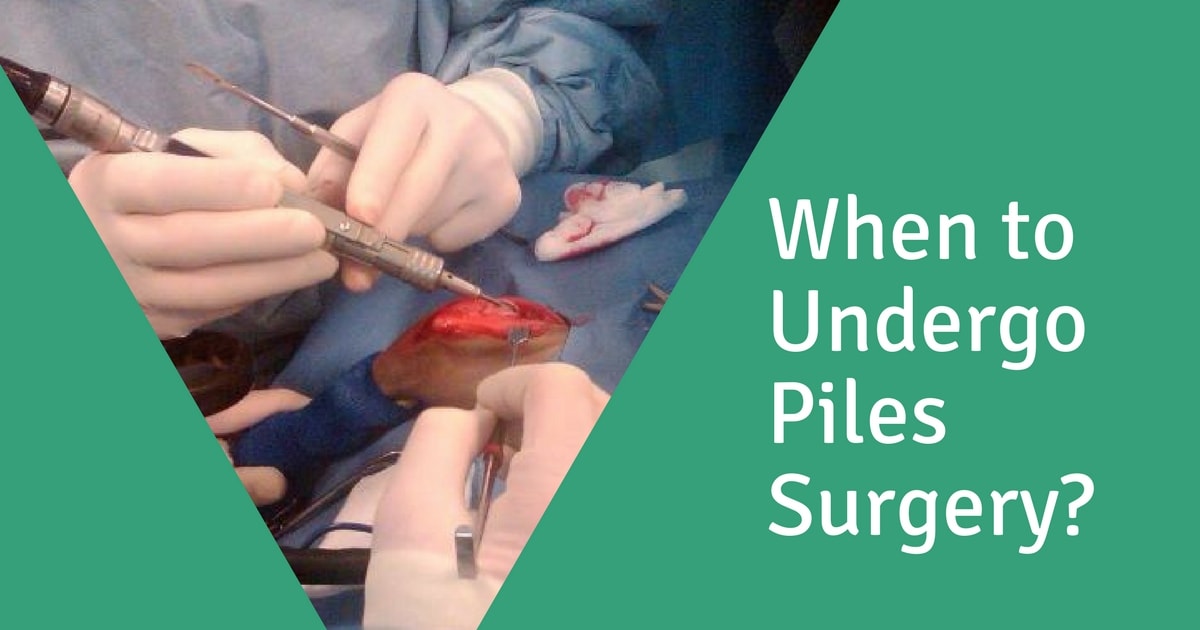Piles Surgery – When to get operated?
The instance of piles or haemorrhoid has shot up in recent years. This is because of change in lifestyle and wrong food habits. People with piles want to get rid of piles. But they are unable to determine the type of piles treatment. Is haemorrhoidectomy or piles surgery suitable for all piles patients? Let us explore.
How piles happens?
Piles simply happens because of sedentary lifestyle and the non-fiber food we eat. The body’s internal organs virtually do not have any movement in a sedentary lifestyle. The food we eat is full of non-fiber containing carb. The non-fibrous carb are easily digested. But they do not get pushed out of the colon. This is because the digested carb has less water content. As a result the person has to put pressure to push the stools out. This anal pressure impacts the veins in the anal region. Any prolonged impact and pressure on the anal veins leads to piles. Irritable Bowel Syndrome (IBS) and chronic diarrhea are the other two conditions that can also cause piles.
Types of Piles and the grades
The veins inside the anal region gets impacted causing Internal piles. Similarly the veins in the periphery of the anal canal or anal region gets impacted causing external piles. While internal piles can grow and prolapse, external piles is already outside giving the typical discomfort and pain associated with it. There are four grades of internal piles. The grades of internal piles determines the need for piles surgery.
Haemorrhoidectomy (Piles Surgery) is recommended under what conditions?
All prolapsed piles requires Haemorrhoidectomy or piles surgery. Similarly, all thrombosed veins also require haemorrhoidectomy surgery. When the veins prolapses three possibilities can occur.
- The vein tuft can come and automatically go inside.
- The patient can be manually push the vein tuft inside.
- The vein tuft cannot prolapse or go inside the anus and keeps externally hanging causing pain.
So haemorrhoidectomy surgery or piles surgery is recommended for grade-3 and grade-4 internal piles. For all types of external piles, Haemorrhoidectomy surgery is recommended. Even if the piles is not in grade 3 or 4 but if the following conditions exists, it is time for haemorrhoidectomy surgery.
-
The piles causes profuse bleeding that it can lead to anemic conditions.
-
If the piles thromboses, a condition where blood clot has formed inside the piles causing extreme pain.
-
The piles condition remains symptomatic despite conservative treatments.
Dr Maran’s opinion on haemorrhoidectomy
Dr. Maran, a piles specialist in Chennai performs piles surgery in Chennai on a regular basis. He is of the opinion that only a piles surgeon can ascertain the stage of any piles condition and whether the existing piles needs a surgical management. So let your piles surgeon examine you first and let know the stage. If you are suffering from severe constipation, you may want to get yourself examined with Dr. Maran, the piles surgeon in Chennai.
The piles specialist in Chennai recommends rubber band ligation for grade 1 and 2 of internal piles. He recommends stapled haemorrhoidectomy surgery for patients suffering from grade-3 and grade-4 internal piles. His recommendation for piles surgery is more so for prolapsed piles.
Dr Maran tells us that mostly the external piles undergoes thrombosis. He also informs us that the thrombosed piles resolve on their own. He recommends to closely observe and monitor the external piles. If they do not resolve in a weeks’ time on its own, then the pain and discomfort may become high. The piles specialist recommends haemorrhoidectomy or piles surgery in such a scenario.

